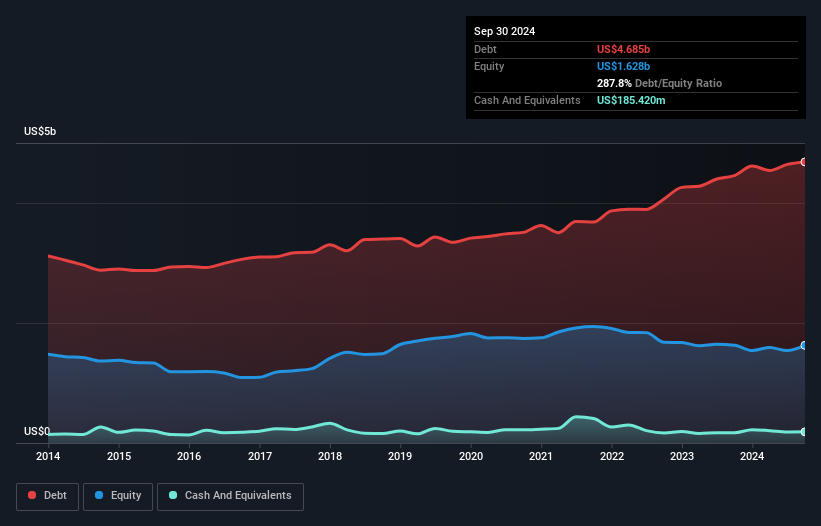- United States
- /
- Consumer Services
- /
- NYSE:SCI
Is Service Corporation International (NYSE:SCI) Using Too Much Debt?

Legendary fund manager Li Lu (who Charlie Munger backed) once said, 'The biggest investment risk is not the volatility of prices, but whether you will suffer a permanent loss of capital.' So it seems the smart money knows that debt - which is usually involved in bankruptcies - is a very important factor, when you assess how risky a company is. Importantly, Service Corporation International (NYSE:SCI) does carry debt. But is this debt a concern to shareholders?
When Is Debt Dangerous?
Generally speaking, debt only becomes a real problem when a company can't easily pay it off, either by raising capital or with its own cash flow. In the worst case scenario, a company can go bankrupt if it cannot pay its creditors. However, a more usual (but still expensive) situation is where a company must dilute shareholders at a cheap share price simply to get debt under control. By replacing dilution, though, debt can be an extremely good tool for businesses that need capital to invest in growth at high rates of return. When we think about a company's use of debt, we first look at cash and debt together.
Check out our latest analysis for Service Corporation International
What Is Service Corporation International's Debt?
As you can see below, at the end of September 2024, Service Corporation International had US$4.69b of debt, up from US$4.45b a year ago. Click the image for more detail. However, because it has a cash reserve of US$185.4m, its net debt is less, at about US$4.50b.

A Look At Service Corporation International's Liabilities
Zooming in on the latest balance sheet data, we can see that Service Corporation International had liabilities of US$743.2m due within 12 months and liabilities of US$15.0b due beyond that. On the other hand, it had cash of US$185.4m and US$133.4m worth of receivables due within a year. So its liabilities total US$15.5b more than the combination of its cash and short-term receivables.
When you consider that this deficiency exceeds the company's huge US$12.8b market capitalization, you might well be inclined to review the balance sheet intently. Hypothetically, extremely heavy dilution would be required if the company were forced to pay down its liabilities by raising capital at the current share price.
We use two main ratios to inform us about debt levels relative to earnings. The first is net debt divided by earnings before interest, tax, depreciation, and amortization (EBITDA), while the second is how many times its earnings before interest and tax (EBIT) covers its interest expense (or its interest cover, for short). The advantage of this approach is that we take into account both the absolute quantum of debt (with net debt to EBITDA) and the actual interest expenses associated with that debt (with its interest cover ratio).
Service Corporation International's debt is 3.7 times its EBITDA, and its EBIT cover its interest expense 3.5 times over. This suggests that while the debt levels are significant, we'd stop short of calling them problematic. Even more troubling is the fact that Service Corporation International actually let its EBIT decrease by 3.2% over the last year. If it keeps going like that paying off its debt will be like running on a treadmill -- a lot of effort for not much advancement. There's no doubt that we learn most about debt from the balance sheet. But ultimately the future profitability of the business will decide if Service Corporation International can strengthen its balance sheet over time. So if you're focused on the future you can check out this free report showing analyst profit forecasts.
Finally, a company can only pay off debt with cold hard cash, not accounting profits. So we always check how much of that EBIT is translated into free cash flow. In the last three years, Service Corporation International's free cash flow amounted to 50% of its EBIT, less than we'd expect. That's not great, when it comes to paying down debt.
Our View
Mulling over Service Corporation International's attempt at staying on top of its total liabilities, we're certainly not enthusiastic. Having said that, its ability to convert EBIT to free cash flow isn't such a worry. Overall, we think it's fair to say that Service Corporation International has enough debt that there are some real risks around the balance sheet. If all goes well, that should boost returns, but on the flip side, the risk of permanent capital loss is elevated by the debt. There's no doubt that we learn most about debt from the balance sheet. But ultimately, every company can contain risks that exist outside of the balance sheet. For instance, we've identified 2 warning signs for Service Corporation International that you should be aware of.
Of course, if you're the type of investor who prefers buying stocks without the burden of debt, then don't hesitate to discover our exclusive list of net cash growth stocks, today.
New: Manage All Your Stock Portfolios in One Place
We've created the ultimate portfolio companion for stock investors, and it's free.
• Connect an unlimited number of Portfolios and see your total in one currency
• Be alerted to new Warning Signs or Risks via email or mobile
• Track the Fair Value of your stocks
Have feedback on this article? Concerned about the content? Get in touch with us directly. Alternatively, email editorial-team (at) simplywallst.com.
This article by Simply Wall St is general in nature. We provide commentary based on historical data and analyst forecasts only using an unbiased methodology and our articles are not intended to be financial advice. It does not constitute a recommendation to buy or sell any stock, and does not take account of your objectives, or your financial situation. We aim to bring you long-term focused analysis driven by fundamental data. Note that our analysis may not factor in the latest price-sensitive company announcements or qualitative material. Simply Wall St has no position in any stocks mentioned.
About NYSE:SCI
Service Corporation International
Provides deathcare products and services in the United States and Canada.
Established dividend payer with proven track record.
Similar Companies
Market Insights
Community Narratives



